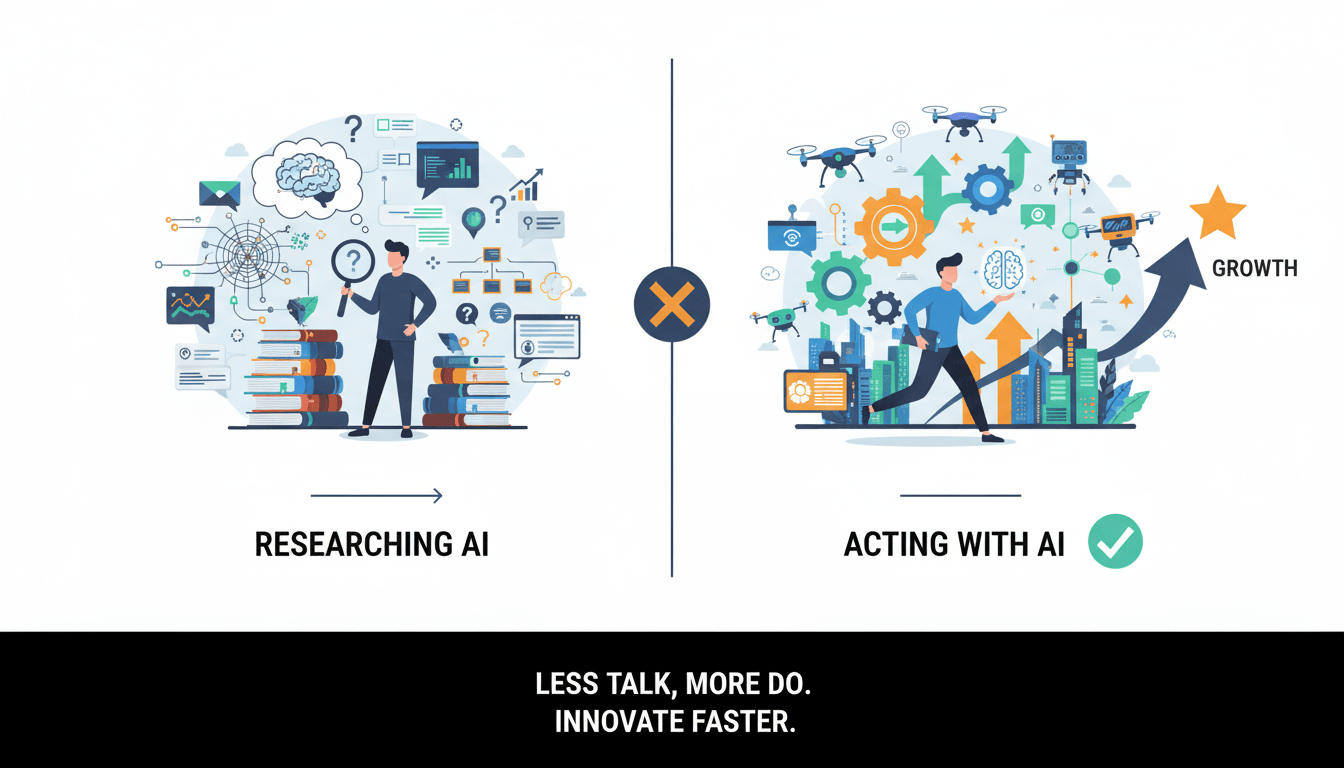· The Rapid Architect Team · AI · 5 min read
AI Transformations in Key SMB Sectors: Real-World Case Studies and Insights
In the fast-evolving world of technology, artificial intelligence (AI) is no longer a futuristic concept reserved for tech giants. For small to medium businesses (SMBs), AI has become a practical tool driving efficiency, growth, and innovation.

AI Transformations in Key SMB Sectors: Real-World Case Studies and Insights
Podcast Discussion
AI Transformations in Key SMB Sectors: Real-World Case Studies and Insights
In today’s fast-evolving business landscape, artificial intelligence (AI) is no longer a luxury reserved for large corporations. Small and medium-sized businesses (SMBs) are harnessing AI to drive efficiency, boost profits, and shift from routine operations to strategic advisory roles. This blog post dives into transformations across three critical sectors: accounting, marketing, and banking. Drawing from recent case studies, we’ll explore how AI is leveling the playing field, with examples of profit gains and role evolutions. Whether you’re an SMB owner or leader, these insights can guide your AI adoption strategy.
AI in Accounting: From Compliance to Strategic Advisory
Accounting has traditionally been bogged down by manual data entry, compliance checks, and repetitive tasks. AI is changing that by automating the mundane, allowing professionals to focus on high-value advisory services. A recent study highlights that 79% of accountants expect their advisory roles to expand, with 95% already using automation for tasks like payroll and data entry, leading to increased efficiency and revenue growth for 94% of firms.
Case Study 1: Digits’ AI-Driven Bookkeeping for Startups Digits, a fintech company specializing in accounting software for startups and SMBs, uses AI to automate bookkeeping, expense management, and financial reporting. By analyzing transaction data in real-time, their platform reduces errors by up to 90% and cuts processing time significantly. One SMB client, a small e-commerce business, reported a 30% reduction in operational costs and a 15% profit boost within six months, as accountants shifted focus to advisory services like cash flow forecasting. This transformation exemplifies how AI frees up time for strategic insights, turning accountants into business advisors.
Case Study 2: MIT Sloan-Tracked AI Implementation in Accounting Firms Research from MIT Sloan shows that accountants using AI-enabled software reallocated about 8.5% of their time from routine data entry to high-value tasks like business communication and quality assurance. In a real-world example, a mid-sized U.S. accounting firm integrated generative AI tools, resulting in a 20-40% productivity uplift and enhanced client satisfaction through proactive advisory on tax strategies. This shift not only improved profit margins by streamlining workflows but also addressed talent shortages by upskilling staff.
These examples illustrate a broader trend: AI in accounting is projected to grow at 43% from 2024-2029 for SMBs, enabling profit boosts through advisory expansions.
AI in Marketing: Personalization and Efficiency Gains
Marketing for SMBs often involves limited budgets and resources, but AI is revolutionizing this by enabling hyper-personalized campaigns and data-driven decisions. According to recent statistics, 77% of SMBs have adopted AI in marketing functions, leading to improved customer engagement and revenue growth.
Case Study 1: Vendasta’s AI Tools for Local SMB Marketing Vendasta, a platform for digital agencies serving SMBs, uses AI to automate content creation, SEO optimization, and customer targeting. A case involving a small retail business saw AI-driven email personalization increase open rates by 35% and conversion rates by 25%, resulting in a 20% revenue uplift. Marketers shifted from manual campaign setup to strategic analysis, boosting overall profitability.
Case Study 2: Antematter’s AI Agents for SMB Growth Antematter highlights AI agents in marketing automation, where a mid-sized e-commerce SMB implemented chatbots and predictive analytics. This reduced marketing costs by 40% while increasing lead generation by 50%, allowing the team to focus on creative strategy and advisory roles like market trend forecasting. The result? A 30% profit margin improvement through targeted campaigns.
AI’s role here is clear: It transforms marketers from executors to strategists, with tools like predictive analytics driving measurable profit boosts.
AI in Banking: Enhanced Customer Journeys and Risk Management
In banking, AI is blending automation with human insights to improve customer experiences and operational efficiency. Projections indicate AI could add $340 billion to the banking industry through generative tools, with SMBs benefiting from personalized services and fraud detection.
Case Study 1: Bank of America’s Erica Virtual Assistant Bank of America, serving many SMB clients, deployed its AI-powered virtual assistant Erica, which handles queries, fraud alerts, and financial advice. For SMB users, this meant faster loan approvals and personalized cash management, reducing operational costs by 20% and boosting client retention by 15%. Advisors shifted to high-level consulting, enhancing profit through premium services.
Case Study 2: UXDA’s Digital Banking AI Implementations UXDA’s collection of 21 case studies includes a fintech serving SMBs that used AI for chatbots and predictive lending. One example: A small business bank reduced service costs by 10x and improved fraud detection, leading to a 40% productivity boost and advisory shifts toward strategic financial planning.
These transformations show AI’s power in banking to drive efficiency and create advisory opportunities, ultimately lifting SMB profits.
Conclusion: Embracing AI for SMB Success
AI is reshaping accounting, marketing, and banking for SMBs by automating routines and elevating roles to strategic advisory. The case studies above demonstrate tangible profit boosts and efficiency gains, but success requires thoughtful implementation—starting with skills training and data quality. If you’re an SMB leader, consider piloting AI in one area to see the impact. Stay ahead by exploring these trends, and watch your business thrive in 2025 and beyond.
Citations
- [5] UXDA. (2025). Case Studies on Digital Banking AI Implementations. https://www.uxda.com/case-studies
- [6] McKinsey. (2025). The Economic Potential of Generative AI: The Next Productivity Frontier. https://www.mckinsey.com/capabilities/mckinsey-digital/our-insights/the-economic-potential-of-generative-ai-the-next-productivity-frontier
- [16] Antematter. (2025). AI Agents for Business Growth. https://www.antematter.ai/post/ai-agents-for-business-growth
- [23] Vendasta. (2025). AI-Powered Marketing Solutions for SMBs. https://www.vendasta.com/blog/ai-marketing-solutions-for-smbs
- [24] Forbes. (2025). AI in Marketing for Small Businesses. https://www.forbes.com/sites/forbesbusinesscouncil/2025/08/15/ai-in-marketing-for-smbs
- [25] Accounting Today. (2025). AI Transforming Accounting Roles. https://www.accountingtoday.com/news/ai-transforming-accounting-roles
- [36] Bank of America. (2025). Erica Virtual Assistant Case Study. https://business.bofa.com/en-us/content/erica-virtual-assistant.html
- [40] MIT Sloan. (2025). How AI Is Transforming Accounting Productivity. https://sloanreview.mit.edu/article/how-ai-is-transforming-accounting
- [45] McKinsey. (2025). AI Adoption for Small Businesses. https://www.mckinsey.com/business-functions/mckinsey-digital/our-insights/ai-adoption-for-small-businesses
- [46] Market Research. (2025). AI in Accounting Market 2024-2029. https://www.marketresearch.com/report/ai-accounting-market
- [49] PwC. (2025). AI for Small Businesses. https://www.pwc.com/us/en/tech-effect/ai-analytics/ai-for-small-business.html
- [55] Digits. (2025). AI Bookkeeping Case Study. https://www.digits.com/case-studies/smb-accounting




